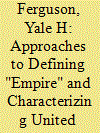| Srl | Item |
| 1 |
ID:
084670


|
|
|
|
|
| Publication |
2008.
|
| Summary/Abstract |
The militant unilateralism of the George W. Bush administration has revived interest in such closely related and contested terms as "superpower,""hegemon,""empire," and "imperialism." This article identifies four different but somewhat overlapping approaches to defining "empire": ideal type, self-consciously empirical, constructivist, and overtly normative. The author's personal view is that any notion of American Empire or indeed U.S. hegemony or even superpower is profoundly misleading. Although the United States still ranks high on the scale of most traditional realist power factors, United States capabilities appear to be gravely waning today and its exercise of both hard and soft power has recently been so inept as to limit its current influence and possibly future role in global politics.
|
|
|
|
|
|
|
|
|
|
|
|
|
|
|
|
| 2 |
ID:
113893


|
|
|
|
|
| Publication |
2011.
|
| Summary/Abstract |
This article discusses the ways in which white, male, United States soldiers make sense of both themselves and Iraqi others. Drawing from qualitative interviews with twenty-four said soldiers from southern Indiana, most of whom having deployed to Iraq, it is shown how these soldiers perform gendered and racialized Orientalist discourses to rationalize United States empire and in particular the military occupation of Iraq. Specifically, imperialist discourses that imagine a superior "us" and an inferior "them" and understand United States state violence as ultimately a Western humanitarian "rescue" are shown to be powerful cultural logics in the sense-making practices of the interviewed soldiers. This article then is concerned with what others have called "practical Orientalism"-or the ways in which formal and official Orientalist discourses are adopted by everyday actors.
|
|
|
|
|
|
|
|
|
|
|
|
|
|
|
|